entire issue [pdf 2.79 mb] - Pitt Med - University of Pittsburgh
entire issue [pdf 2.79 mb] - Pitt Med - University of Pittsburgh
entire issue [pdf 2.79 mb] - Pitt Med - University of Pittsburgh
Create successful ePaper yourself
Turn your PDF publications into a flip-book with our unique Google optimized e-Paper software.
enal diseases. John Hibbs is DistinguishedPr<strong>of</strong>essor <strong>of</strong> Internal <strong>Med</strong>icine and chief <strong>of</strong>the Division <strong>of</strong> Infectious Diseases at the<strong>University</strong> <strong>of</strong> Utah in Salt Lake City, whereformer classmate James Kushner is theM.M. Wintrobe Distinguished Pr<strong>of</strong>essor <strong>of</strong>Internal <strong>Med</strong>icine and heads the Division <strong>of</strong>Hematology. Hibbs garnered a Nobel Prizenomination for teasing out the biochemistry<strong>of</strong> nitric oxide. Kushner serves as director <strong>of</strong>the <strong>University</strong> <strong>of</strong> Utah’s Center <strong>of</strong> Excellencein Molecular Hematology; he delves intogenetic disorders <strong>of</strong> iron metabolism.These far-flung old friends gathered thiswinter through teleconferences. Here we shareexcerpts <strong>of</strong> two recent conversations.PM: What do you reme<strong>mb</strong>er <strong>of</strong> oneanother as students?Kushner: My most striking memory <strong>of</strong>Albert Braverman involves incredible glasswarebreakage during biochemistry lab. He smokedTurkish cigarettes.Braverman: Gauloise. My wife is Turkish,but I don’t smoke anymore.Brenner: Albert and I were in adjacentrooms on the eighth floor <strong>of</strong> Salk Hall. Havinghim as a next-door neighbor was one <strong>of</strong> thegreat enrichments <strong>of</strong> my young life. He carriedan aura <strong>of</strong> goodwill that spread to everyone hemet and touched.Hibbs: We would <strong>of</strong>ten eat together in thecafeteria at Scaife Hall and have these wonderful,free-ranging discussions, always intellectual.Brenner: On Friday nights, we’d go downto Cantor’s in Oakland. It was $2.95 a dinner.Not much wine was poured, but they did havewonderful food. Those dinners were probablythree hours.Braverman: I came to medical school interestedin psychiatry. Because <strong>of</strong> Barry, my interestturned to science. He was the first person Iknew personally who had an intellectual interestin science and clinical medicine. John had intelligence,breadth, moral rectitude, seriousness,and good humor. It was a tremendously enrichingtime.Brenner: John was tall, very handsome,casual in appearance. Never the type to interrupt,he’d just let you talk and then he’drespond. Jim was very smart, witty. <strong>Pitt</strong> was myfirst away-from-home experience. Right fromthe start, Jim, you were in an apartment.Kushner: I lived on the second floor <strong>of</strong> afuneral parlor on Negley Avenue. In the evening,I and my roommate—Eduardo Delgado(MD ’60)—would cruise through the salonsand, instead <strong>of</strong> supper, eat all the chocolatesthat were set out for the mourners.Brenner: But did you have any e<strong>mb</strong>almingresponsibilities?Kushner: Barry, I reme<strong>mb</strong>er you were veryfunny, with round glasses and an ability toincorporate knowledge at a tremendous pace.<strong>Med</strong>ical school seemed very easy for you.Brenner: I spent that whole summer beforemedical school working in the post <strong>of</strong>fice. Theforeman told me, “You better do well in medicalschool because you wouldn’t have any futurehere.” I was motivated, having been cut <strong>of</strong>ffrom this other opportunity.Braverman: I was a very successful messagerunner on Wall Street. That career wasopen to me.Kushner: Barry, you were commentingthat John was a casual guy. John is a hopelessromantic. He sees drama and romanceeverywhere, particularly in science. I reme<strong>mb</strong>erwhen he was first discovering the pathway fromL-arginine to L-citrulline and nitric oxide, andhow macrophages got activated. It was likelistening to the most wild-eyed guy in UnionSquare standing on a soapbox.Braverman: I reme<strong>mb</strong>er John’s macrophagepaper. I had my doubts about the immunotherapy<strong>of</strong> cancer, and here I saw this paperin Science—and from macrophages and cancercame an overwhelmingly important discovery[the mechanism for formation <strong>of</strong> nitric oxide inthe human body] that was completely separate.Brenner: John should have received theNobel.Kushner: He couldn’t. He doesn’t havea tie.Brenner: I would not have guessed, fromthe four years we were in medical school, thatJohn Hibbs was destined for a career in basicscience. John, tell me why I missed it.Hibbs: When I was in medical school, Ididn’t do any science other than our laboratories—biochemistry,physiology, etc.—the smellsand the activity seemed far removed from clinicalmedicine and what we were learning fromthe textbooks and pr<strong>of</strong>essors.Braverman: When did it change for you?Hibbs: Jim and I were both drafted whenwe were interns. There was a hemorrhagicfever epidemic that began in eastern Bolivia,and I volunteered to go down and work withsome scientists from the NIH. It was physicaladventure, but the research turned out to beintellectual adventure.There’s nothing more stimulating than workingin a basic research laboratory, once you learnhow to use the scientific method. It’s so powerful,so basic, and it’s the rigorous testing <strong>of</strong> knowledgethat separates science from superstition, fromideology, theology. It doesn’t produce absolutetruth, but it gets us closer. There’s so much excitementin seeing things for the first time.Kushner: See what I mean about him being aromantic? I found my transforming event in thepathology laboratory experience with Frank Dixon[the pathologist who showed that the immuneresponse could cause disease].Brenner: One <strong>of</strong> my interviewers was [molecularbiochemist] Harold Segal. Not only did heset in motion my acceptance letter, but with itcame an invitation to start work in his laboratoryon the day I started medical school. I sent <strong>of</strong>f amanuscript in January <strong>of</strong> my first year. It has myname as B. Morton Brenner. I went through thisaffectation that lasted only as long as that paper.Someone said to me, “Oh my god. I’ve been callingyou Barry. I should call you Morton.” I said,“Never mind, I’ll change my name back.”PM: What was <strong>Pitt</strong> like then?Braverman: This was the decade in whichmolecular biology came into being. The microbiologycourse was where we heard about tRNA andmRNA and all the things that were coming outthen, where we got the foundation.Brenner: I think it was the virology component,Al. Julius Youngner was giving these lectureswhere it was as if he would read a paper and thefollowing week, the material was incorporated intothe lecture. There was almost no dwell time.We got to do that serum sickness experimentunder [pathologist] Joseph Feldman’s guidance.Braverman: Low titer, medium titer, hightiter. <strong>Med</strong>ium titer did it.Hibbs: The School <strong>of</strong> <strong>Med</strong>icine had gatheredtogether a unique group <strong>of</strong> human beings bothin basic science and the clinical years. It was likeAthens during its heyday or Florence during theRenaissance.Braverman: One person was more uniquethan the others. [Department <strong>of</strong> <strong>Med</strong>icine chair]Jack Myers was a force in Jim Kushner, I can attestto that.Kushner: As a physician, a clinician, everythingabout me—my whole personality—wastransformed by him. He knew his own mind. Hehad the courage to think through a clinical situation.And he really believed that doctors had totake responsibility to do things that were difficult.Brenner: I reme<strong>mb</strong>er presenting to Jack atthe bedside, at 10 o’clock in the morning. Youworked up the patient the night before, finishedaround midnight, stayed in that little PresbyterianHospital library, read everything you could aboutthe diagnosis you were entertaining. This year,on my first day <strong>of</strong> general medicine, I had a kid26 PITTMED


![entire issue [pdf 2.79 mb] - Pitt Med - University of Pittsburgh](https://img.yumpu.com/50435398/28/500x640/entire-issue-pdf-279-mb-pitt-med-university-of-pittsburgh.jpg)
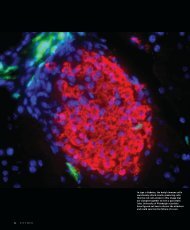
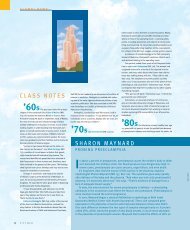
![entire issue [pdf 6.47 mb] - Pitt Med - University of Pittsburgh](https://img.yumpu.com/50360689/1/190x231/entire-issue-pdf-647-mb-pitt-med-university-of-pittsburgh.jpg?quality=85)
![entire issue [pdf 12.7 mb] - Pitt Med - University of Pittsburgh](https://img.yumpu.com/49831615/1/190x231/entire-issue-pdf-127-mb-pitt-med-university-of-pittsburgh.jpg?quality=85)
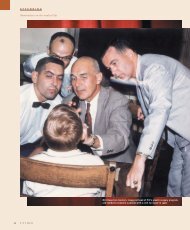
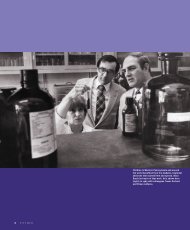
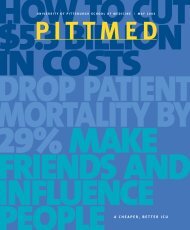
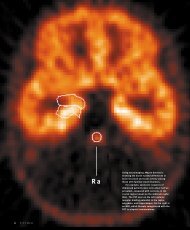
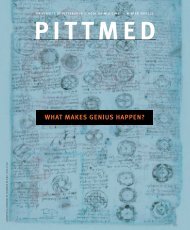


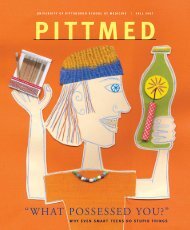
![entire issue [pdf 11.3 mb] - Pitt Med - University of Pittsburgh](https://img.yumpu.com/46685830/1/190x231/entire-issue-pdf-113-mb-pitt-med-university-of-pittsburgh.jpg?quality=85)
![entire issue [pdf 12.7 mb] - Pitt Med - University of Pittsburgh](https://img.yumpu.com/44997419/1/190x231/entire-issue-pdf-127-mb-pitt-med-university-of-pittsburgh.jpg?quality=85)